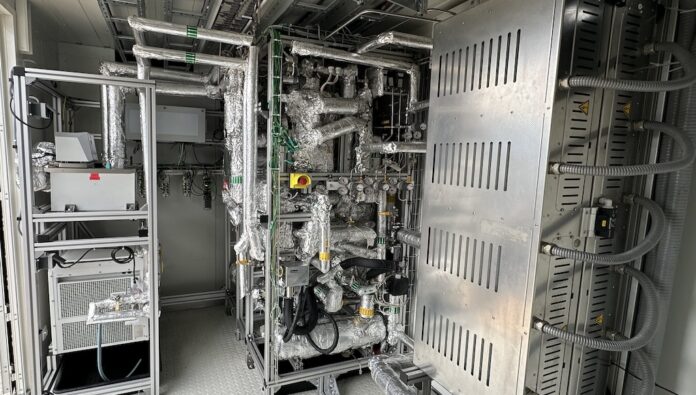
At Eurosatory 2024, Rheinmetall announced a new alternative fuel production concept under the Giga-PtX project, which, according to the company study, will offer an efficient, dependable diesel fuel independent of existing fossil-fuel hydrocarbon supply chain that will be able to support military consumption with more survivable and sustainable production and distribution. This groundbreaking vision ensures the armed forces a secure, war-ready fuel supply dependent on water and CO₂ precursors and grid-independent energy sources (such as wind-generated electricity). Unlike the supply chain based on fossil fuels that are prone to collapse in wartime, the Giga-PtX approach aims to establish a robust, localized synthetic fuel production network located near electrical energy generation facilities, thus enhancing combat readiness while contributing to defossilization.
Addressing Fuel Supply Challenges
A secure and reliable fuel supply is essential for military forces’ combat readiness. The current fossil fuel supply chains are designed for peacetime operations. At war, they are logistically complex and vulnerable to wartime disruptions, as seen in the Russo-Ukraine war.
Traditional fossil diesel and kerosene remain the backbone of the military energy supply, with the average fuel requirement in wartime ranging from 20 to 60 liters per day per soldier. Fuel logistics are critical, as evidenced by the fact that 60% of NATO casualties in Afghanistan were related to logistics, predominantly fuel logistics.
The Giga-PtX project seeks to mitigate these risks by investing in a distributed network of renewable energy sources and synthesizing e-fuels to supply diesel fuel to users from multiple locations. These synthetic fuels can be produced efficiently and integrated into existing logistics systems (pipelines, tank farms, tankers, etc.), providing a resilient and sustainable energy solution for military operations. Each synthesizing unit can be packed in several ISO containers that can be moved on tracks, trains or ships, each facility can be relocated quickly to compensate for combat damage or increased demand. Such facilities can also be installed on large ships, such as amphibious ships or aircraft carriers, leveraging the platform’s unlimited energy supply (nuclear reactor) to supply aircraft jet fuel or diesel for amphibious forces.
Hydrogen is a key component in producing synthetic fuels, indispensable for military applications due to their high energy density and ease of use. Rheinmetall leverages over 20 years of experience in hydrogen technology to develop efficient and cost-effective solutions for producing, storing, transporting, and utilizing hydrogen.
The Giga-PtX Vision
Unlike the centralized approach of crude oil-based fuel refining, the Giga-PtX project envisions a network of decentralized synthetic fuel production plants, each with a capacity of up to 50 MW. These plants combine energy generation, hydrogen, CO₂ supply, and fuel synthesis in one location, ideally near military units or pipeline systems. Utilizing renewable energy, each plant can produce several thousand tonnes of fuel annually without requiring electrical grid expansion. Initially, CO₂ can be sourced from power plants, cement works, and biogenic sources, making direct air capture unnecessary in the short term. Relying on available energy, clean water, and CO₂ resources, production costs are expected to be lower than diesel refined from fossil fuel with the added advantage of lower carbon footprint and fuel independence.
The decentralized nature of the Giga-PtX network makes it difficult to target and disrupt. The moderate size of the plants allows for rapid scaling and low-risk replication of tested prototypes. This strategic distribution ensures a resilient fuel supply, enhancing military forces’ operational readiness and sustainability. In partnership with Ineratec, Rheinmetall is poised to offer a scalable and replicable solution to address the armed forces’ critical fuel supply challenges. The Giga-PtX project represents a forward-looking approach to military fuel logistics, ensuring that armed forces remain operationally ready and sustainable in an increasingly volatile global landscape.
Ineratec is known for its sustainable and ready-to-use e-fuels. These synthetic fuels, including Sustainable Aviation Fuel (SAF), e-diesel, and e-methanol, are derived from recycled CO₂ and renewable energy. They are CO₂-neutral and miscible with conventional fuels, which means that no adjustments to engines, logistics, or infrastructure are required.
Ineratec is building what is currently the largest production plant for sustainable e-fuel in Frankfurt am Main, making it a pioneering plant for the global use of Power-to-Liquid technology. The production plant in Industriepark Höchst, one of the largest research and production sites for the chemical and pharmaceutical industry in Europe, will produce up to 2,500 tons of sustainable e-fuel per year.



















